 According to Sig Christenson, on 11-Nov-1997, George Bush defended his father's decision during the Gulf War not to remove Saddam Hussein.
According to Sig Christenson, on 11-Nov-1997, George Bush defended his father's decision during the Gulf War not to remove Saddam Hussein.There are a lot of Americans (who say), 'Why didn't you go get him?' Well, I'm confident that losing men and women as a result of sniper fire inside of Baghdad would have turned the tide of public opinion very quickly. . . would have transformed the battle from a desert conflict to an unpopular guerrilla war.
 In Airforce Magazine, John T. Correll wrote that the Evolution of the Bush Doctrine in foreign policy began with the future 43rd president's September 1999 address at The Citadel where he said,
In Airforce Magazine, John T. Correll wrote that the Evolution of the Bush Doctrine in foreign policy began with the future 43rd president's September 1999 address at The Citadel where he said, Sending our military on vague, aimless, and endless deployments is the swift solvent of morale. ... I will work hard to find political solutions that allow an orderly and timely withdrawal from places like Kosovo and Bosnia. We will encourage our allies to take a broader role. We will not be hasty. But we will not be permanent peacekeepers, dividing warring parties. This is not our strength or our calling.Two Years Before 9/11, candidate Bush was already talking privately about attacking Iraq, according to his former ghost writer, author and journalist Mickey Herskowitz, who has quoted Bush as saying:
One of the keys to being seen as a great leader is to be seen as a commander-in-chief. . . My father had all this political capital built up when he drove the Iraqis out of Kuwait and he wasted it. . . . If I have a chance to invade - if I had that much capital, I'm not going to waste it. I'm going to get everything passed that I want to get passed and I'm going to have a successful presidency.Herskowitz also reports,
He told me that as a leader, you can never admit to a mistake. That was one of the keys to being a leader.
 Paul O'Neill, Bush's first Secretary of Treasury (fired) saw documents showing that in early 2001 the administration was already considering the use of force to oust Saddam, as well as planning for the aftermath.
Paul O'Neill, Bush's first Secretary of Treasury (fired) saw documents showing that in early 2001 the administration was already considering the use of force to oust Saddam, as well as planning for the aftermath.From the very beginning, there was a conviction that Saddam Hussein was a bad person and that he needed to go. . . For me, the notion of pre-emption, that the U.S. has the unilateral right to do whatever we decide to do, is a really huge leap. . . . It was all about finding a way to do it. That was the tone of it. The president saying 'Go find me a way to do this'.In the interview in December 2001, only three months after the 911 attacks, Bush admitted that "there was a significant difference in my attitude after September 11" about al-Qaeda and the threat it posed to the United States.
Before the attacks, he said:
I was not on point, but I knew he was a menace, and I knew he was a problem. I knew he was responsible, or we felt he was responsible, for the previous bombings that killed Americans. I was prepared to look at a plan that would be a thoughtful plan that would bring him to justice, and would have given the order to do that. I have no hesitancy about going after him. But I didn't feel that sense of urgency, and my blood was not nearly as boiling.Robert Parry, Bush's Alderaan: Time magazine reported that in March 2002 – a full year before the invasion – Bush outlined his real thinking to three U.S. senators. Bush disclosed this after sticking his head in the door of a White House meeting between National Security Adviser Condoleezza Rice and three senators who had been discussing strategies for dealing with Iraq through the United Nations. The senators laughed uncomfortably at Bush’s remark when he said,
Fuck Saddam. We’re taking him out.Ironically, it was during a March 23rd press conference that Bush, in answering a question about Osama bin Laden, said
Deep in my heart I know the man is on the run, if he's alive at all. Who knows if he's hiding in some cave or not; we haven't heard from him in a long time. And the idea of focusing on one person is -- really indicates to me people don't understand the scope of the mission.
Terror is bigger than one person. And he's just -- he's a person who's now been marginalized. His network, his host government has been destroyed. He's the ultimate parasite who found weakness, exploited it, and met his match. He is -- as I mentioned in my speech, I do mention the fact that this is a fellow who is willing to commit youngsters to their death and he, himself, tries to hide -- if, in fact, he's hiding at all.
So I don't know where he is. You know, I just don't spend that much time on him, Kelly, to be honest with you.
. . . . as I say, we haven't heard much from him. And I wouldn't necessarily say he's at the center of any command structure. And, again, I don't know where he is. I -- I'll repeat what I said. I truly am not that concerned about him. I know he is on the run. I was concerned about him, when he had taken over a country.
. . . . we shoved him out more and more on the margins. He has no place to train his al Qaeda killers anymore.
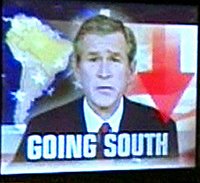 Remarks by President Bush and President Alvaro Uribe of Colombia in Photo Opportunity,(September 25, 2002):
Remarks by President Bush and President Alvaro Uribe of Colombia in Photo Opportunity,(September 25, 2002):The war on terror, you can't distinguish between al Qaeda and Saddam when you talk about the war on terror.7-November-02:
He's (Saddam) a threat because he is dealing with al Qaeda.January 2003; the President invited three members of the Iraqi opposition to join him to watch the Super Bowl. In the course of the conversation the Iraqis realized that the President was not aware that there was a difference between Sunni and Shiite Muslims. He looked at them and said,
You mean...they're not, you know, there, there's this difference. What is it about?Devos Performance Hall, Grand Rapids, Michigan, (January 29, 2003):
My point is, our presence in the world is more than just our might; but our might is needed in the world right now to make the world a more peaceful place. The war on terror is not confined strictly to the al Qaeda that we're chasing. The war on terror extends beyond just a shadowy terrorist network. The war on terror involves Saddam Hussein because of the nature of Saddam Hussein, the history of Saddam Hussein and his willingness to terrorize himself (Sic!).Pat Robertson, founder of the U.S. Christian Coalition and an ardent Bush supporter, recounted on CNN telling Bush before the invasion of Iraq that he should prepare Americans for the likelihood of casualties.
Saddam Hussein has terrorized his own people. He's terrorized his own neighborhood. He is a danger not only to countries in the region, but as I explained last night, because of al Qaeda connections, because of his history, he's a danger to the American people. And we've got to deal with him. We've got to deal with him before it is too late.
Before September the 11th, during a period when a lot of us thought oceans would protect us forever from gathering threats far from our land, the thought of containing somebody like Saddam Hussein made sense -- so we could step back in America and say, gosh, well, don't worry, he's only a threat to somebody in the neighborhood, and we might pick or choose whether or not we're going to help in the neighborhood.
But, see, our fellow citizens must understand that September the 11th, 2001 changed the equation. It's changed the strategic outlook of this country, because we're not protected by oceans. The battlefield is here. And therefore, we must address threats today as they gather, before they become acute.
And I warned him about this war. I had deep misgivings about this war, deep misgivings. . . . I warned him about casualties. . . . And I was trying to say, 'Mr. President, you had better prepare the American people for casualties.' I mean, the Lord told me it was going to be A, a disaster, and B, messy.But the president told him,
We're not going to have any casualties.Robertson described the president at that meeting to CNN's Paula Zahn as
. . . the most self-assured man I've ever met in my life. You remember Mark Twain said, 'He looks like a contented Christian with four aces.' I mean he was just sitting there like, 'I'm on top of the world.'US President George W. Bush and former Spanish Prime Minister José María Aznar discussed plans to go to war with Iraq even while claiming to be seeking a peaceful solution through the UN Security Council, according to the minutes of a meeting in Crawford Texas on 22-Feb-03, less than a month before the 20-Mar-03 invasion. The minutes of that meeting (released by EL PAÍS on 26-Sep-07), show that Bush told Aznar,
There are two weeks left. In two weeks we will be ready militarily… We’ll be in Baghdad by the end of March. We’ll destroy the loyal troops and the [Iraqi] army will really know what this is about. We have given a clear message to Saddam Hussein’s generals: they’ll be treated as war criminals. We’re planning for a post-Saddam Iraq and I think there are grounds for a better future.The President detailed threats against recalcitrant Security Council members and added,
The more the Europeans attack me, the stronger I am in the United States.Aznar response was that
The only thing that worries me is your optimism.Replied the obtuse Bush
I'm optimistic because I believe I'm right. I'm at peace with myself.It was not until March 16, during a meeting in Portugal’s Azores Islands, that Bush, Aznar and Blair publicly announced their war plans. In the intervening period, they had tried and failed to get a new UN resolution approved that would legitimize the invasion, although all three, the minutes indicate, knew that they would go to war even without international support.
After his invasion, asked by Tom Brokaw on 24-April-03 about Shock and Awe as a revolutionary military doctrine, the President observed:
Yes, I think it's true. I think that's an accurate look back. Shock and awe said to many people that all we've got to do is unleash some might and people will crumble. And it turns out the fighters were a lot fiercer than we thought. Because, for example, we didn't come north from Turkey, Saddam Hussein was able to move a lot of special Republican Guard units and fighters from north to south. So the resistance for our troops moving south and north was significant resistance. On the other hand, our troops handled it, handled that resistance quite well.Brokaw:
Did that give you a pause for a while?The President:
Well, first of all, I had confidence in the plan, because I've got confidence in my national security team. Remember, my advisors are people such as Dick Cheney, who had been through the war before as the Secretary of Defense; Colin Powell, who's not only an Army general, but also had been through a war before; Don Rumsfeld, who's a very successful man in the private sector, but also has got great judgment when it comes to the military; Tommy Franks, I really trust Tommy, we speak the same language -- after all, Tommy went to Midland Lee High School, graduated in 1963, one year ahead of Laura; Condi. I get good, solid advice from people who analyzed this war plan, analyzed the strategy, looked over it in depth, had looked at it for quite a bit of time and convinced me that it would lead to victory. . . .Brokaw:
There used to be an American doctrine about when we go to war it's overwhelming force. Now it's speed and flexibility, based on Iraq, and instant communication -- not only behind the scenes, but everybody gets to look in on the battlefield.The President:
Well, the instant communications part was one of the reasons why I was comfortable in giving Tommy Franks and the commanders in the field the go-ahead to take the shot at Saddam Hussein on the first day. Because there in the Oval Office we were getting near instant feedback from eyes on the ground what he was seeing, what he felt the conditions were like. It was an amazing moment to think that a person risking his life, viewing the farms, watching the entries, seeing, observing what was taking place inside one of Saddam's most guarded facilities, was able to pick up a device, call CENTCOM, and CENTCOM would call us in near real-time.
And the ability to communicate has changed the nature of warfare. It allows for more interoperability; more ability for the Navy and the Air Force and the Special Ops and the Army and the Marines to work side by side in a coordinated basis. Which makes it easier to fight a war with flexibility and speed and precision. So the doctrine really has changed.
As well, it's an amazing concept when you think about real-time TV focusing on war. . . . rocketing across the desert. It's an amazing feeling.
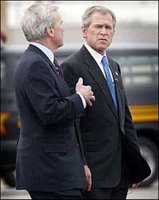 Brokaw asked Bush about borrowing some perspectives and wisdom from his father (the 41st President). Bush admitted that however closely his dad followed the news, he wasn't asking for help or advice. His father,
Brokaw asked Bush about borrowing some perspectives and wisdom from his father (the 41st President). Bush admitted that however closely his dad followed the news, he wasn't asking for help or advice. His father,. . . .follows everything in the news and the opinion . . . he's an every word man.
Well, I really don't spend a lot of time hashing over policy with him. He knows that I am much better informed than he could possibly be. He gives me -- our relationship is more of, and our conversations are more along the line of a dad and a son, a dad conveying to his son how much he loves him. Which is important, even at the age of 56 years old it's important.
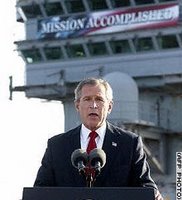 When Bush landed on the USS Abraham Lincoln on May Day, it appeared that every detail of the day's events had been carefully planned, including the president's arrival in the co-pilot's seat of a Navy S-3B Viking after making two flybys of the carrier. The exterior of the four-seat S-3B Viking was marked with "Navy 1" and "George W. Bush Commander in Chief.":
When Bush landed on the USS Abraham Lincoln on May Day, it appeared that every detail of the day's events had been carefully planned, including the president's arrival in the co-pilot's seat of a Navy S-3B Viking after making two flybys of the carrier. The exterior of the four-seat S-3B Viking was marked with "Navy 1" and "George W. Bush Commander in Chief.":Major combat operations in Iraq have ended. In the battle of Iraq, the United States and our allies have prevailed. (Applause.)Remarks by President Bush and Prime Minister Howard of Australia at the Bush Ranch in Crawford Texas (May 3, 2003)
. . . . carried out with a combination of precision and speed and boldness the enemy did not expect, and the world had not seen before. From distant bases or ships at sea, we sent planes and missiles that could destroy an enemy division, or strike a single bunker. Marines and soldiers charged to Baghdad across 350 miles of hostile ground, in one of the swiftest advances of heavy arms in history.
The character of our military through history -- the daring of Normandy, the fierce courage of Iwo Jima, the decency and idealism that turned enemies into allies -- is fully present in this generation.
. . . . We've begun the search for hidden chemical and biological weapons and already know of hundreds of sites that will be investigated.
The battle of Iraq is one victory in a war on terror that began on September the 11, 2001 -- and still goes on.
. . . . Our war against terror is proceeding according to principles that I have made clear to all: Any person involved in committing or planning terrorist attacks against the American people becomes an enemy of this country, and a target of American justice.
. . . . Americans, following a battle, want nothing more than to return home. And that is your direction tonight. (Applause.) After service in the Afghan -- and Iraqi theaters of war -- after 100,000 miles, on the longest carrier deployment in recent history, you are homeward bound.
Question:
Is there a possibility that you may never find weapons of mass destruction in Iraq? And how would that square with your rationale for going to war?The President:
Yes -- the question is about weapons of mass destruction. Saddam Hussein had weapons of mass destruction. The United States -- United Nations Security Council voted 1441, which made the declaration it had weapons of mass destruction. It's well-known it had weapons of mass destruction. And we've also got to recognize that he spent 14 years hiding weapons of mass destruction. I mean, he spent an entire decade making sure that inspectors would never find them. Iraq's the size of the state of California. It's got tunnels, caves, all kinds of complexes. We'll find them. And it's just going to be a matter of time to do so.Interview of the President by TVP, Poland (May 29, 2003):
We found the weapons of mass destruction. We found biological laboratories. You remember when Colin Powell stood up in front of the world, and he said, Iraq has got laboratories, mobile labs to build biological weapons. They're illegal. They're against the United Nations resolutions, and we've so far discovered two. And we'll find more weapons as time goes on. But for those who say we haven't found the banned manufacturing devices or banned weapons, they're wrong, we found them.As Jay Garner, replaced as director of the Iraq Reconstruction Group was on his way out the door 18-June-03, he was slapped on his back by Bush:
Hey Jay, you want to do Iran?The Israeli paper Haaretz (online 25-Jun-03), that Palestinian Authority Prime Minister Abu Mazen, meeting recently with militants to enlist their support for a truce with Israel, said that, when they met in Aqaba, President Bush had told him this:
God told me to strike at al Qaeda and I struck them, and then he instructed me to strike at Saddam, which I did, and now I am determined to solve the problem in the Middle East. If you help me I will act. . . .President George W. Bush, challenging militants attacking U.S. forces in Iraq, July 2, 2003 (CNN):
There are some who, uh, feel like that, you know, the conditions are such that they can attack us there. My answer is: Bring 'em on. We got the force necessary to deal with the security situation.UN speech (9/23/03):
The regime of Saddam Hussein cultivated ties to terror while it built weapons of mass destruction.
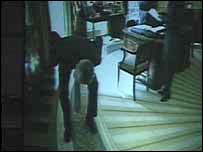 During the Radio & Television Correspondents' Association Dinner on March 24, 2004, Bush was mocking himself in a slide show including images of him searching under furniture in the Oval Office for Iraqi weapons of mass destruction:
During the Radio & Television Correspondents' Association Dinner on March 24, 2004, Bush was mocking himself in a slide show including images of him searching under furniture in the Oval Office for Iraqi weapons of mass destruction:. . . . tonight I'm going to do one of my slide shows. These are actual, unstaged photos pulled from the files of the White House Photo Office. So, ladies and gentlemen, I present a White House election-year album.Those weapons of mass destruction have got to be somewhere. (Laughter and applause.)Press Conference by the President (August 21, 2006): A Question:
As you can tell from the look on Andy Card's face, we've become a little concerned about the Vice President lately. (Laughter.)
Nope, no weapons over there. (Laughter and applause.) Maybe under here. (Laughter.) Oops, this photo wasn't supposed to be in here. This is the Skull and Bones secret signal. (Laughter.)
I'm not paranoid. (Laughter). . . .
Quick follow-up. A lot of the consequences you mentioned for pulling out seem like maybe they never would have been there if we hadn't gone in. How do you square all of that?The President:
I square it because, imagine a world in which you had Saddam Hussein who had the capacity to make a weapon of mass destruction, who was paying suiciders to kill innocent life, who would -- who had relations with Zarqawi. Imagine what the world would be like with him in power. The idea is to try to help change the Middle East.Question:
Now, look, part of the reason we went into Iraq was -- the main reason we went into Iraq at the time was we thought he had weapons of mass destruction. It turns out he didn't, but he had the capacity to make weapons of mass destruction. But I also talked about the human suffering in Iraq, and I also talked the need to advance a freedom agenda. And so my question -- my answer to your question is, is that, imagine a world in which Saddam Hussein was there, stirring up even more trouble in a part of the world that had so much resentment and so much hatred that people came and killed 3,000 of our citizens.
You know, I've heard this theory about everything was just fine until we arrived, and kind of "we're going to stir up the hornet's nest" theory. It just doesn't hold water, as far as I'm concerned. The terrorists attacked us and killed 3,000 of our citizens before we started the freedom agenda in the Middle East.
What did Iraq have to do with that?The President:
What did Iraq have to do with what?Question:
The attack on the World Trade Center?The President:
Nothing, except for it's part of -- and nobody has ever suggested in this administration that Saddam Hussein ordered the attack. Iraq was a -- the lesson of September the 11th is, take threats before they fully materialize, Ken. Nobody has ever suggested that the attacks of September the 11th were ordered by Iraq. I have suggested, however, that resentment and the lack of hope create the breeding grounds for terrorists who are willing to use suiciders to kill to achieve an objective. I have made that case.
And one way to defeat that -- defeat resentment is with hope. And the best way to do hope is through a form of government. Now, I said going into Iraq that we've got to take these threats seriously before they fully materialize. I saw a threat. I fully believe it was the right decision to remove Saddam Hussein, and I fully believe the world is better off without him. Now, the question is how do we succeed in Iraq? And you don't succeed by leaving before the mission is complete, like some in this political process are suggesting.
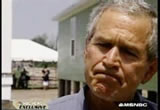 Bush, in an interview with Brian Williams (29-Aug-06):
Bush, in an interview with Brian Williams (29-Aug-06): No, I don't see that at all. The fundamentalist world attacked the United States and killed 3,000 people before I even thought about removing Saddam Hussein from power. I just don't buy that argument. It is an argument that's not based upon fact.Bush, Sept. 6, 2006:
You know, one of the hardest parts of my job is to connect Iraq to the war on terror.Bush, (24 September 2006):
I like to tell people when the final history is written on Iraq, it will look like just a comma.

No comments:
Post a Comment